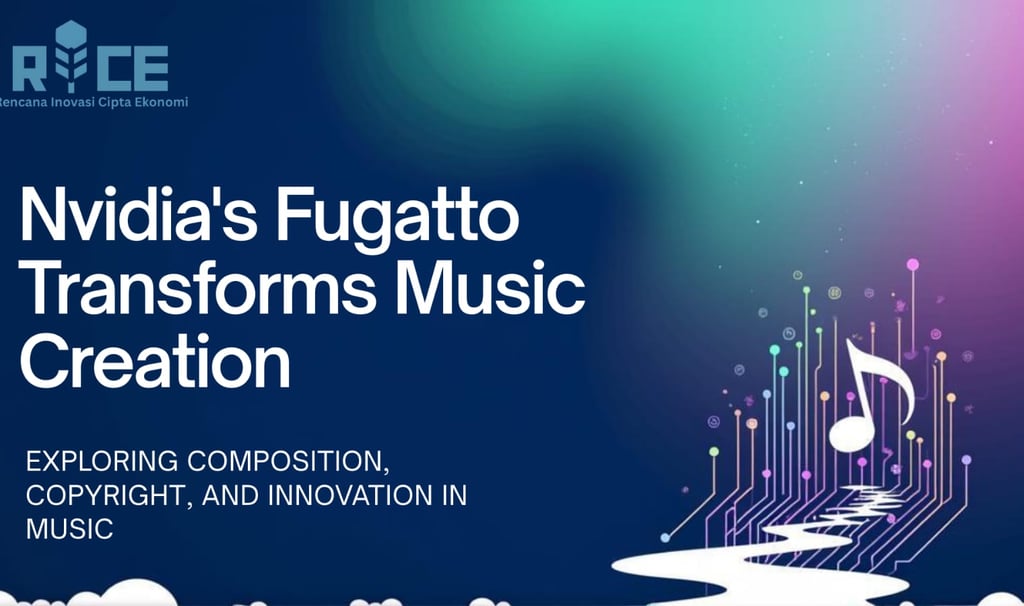Your blog postNvidia's Fugatto and the New Era of AI-Generated Music: Composition, Copyright, and Creative Transformation
Discover how NVIDIA's Fugatto AI generates music and unprecedented sounds from text, revolutionizing audio creativity and challenging the future of production.
RIce AI Consultant (Ratna)
8/22/202510 min read


Introduction: The AI Revolution in Music Creation
The music industry stands at the precipice of what may be its most significant transformation since the advent of digital recording. Artificial intelligence has progressed from a curious novelty to a sophisticated creative tool capable of generating compelling musical compositions—and Nvidia's Fugatto represents perhaps the most ambitious implementation of this technology to date. As generative AI continues to redefine creative boundaries across multiple domains, its incursion into audio production signals a fundamental shift in how music may be created, consumed, and commercialized in the coming years. This article provides a comprehensive analysis of Fugatto's technological capabilities, explores its potential implications across various industries, examines the ethical considerations it raises, and considers the future landscape of AI-assisted music creation.
The development of AI audio generation has followed a trajectory similar to other AI-generated media, progressing from simple tone generation to complex compositions that increasingly mimic human creativity. What sets Fugatto apart from previous approaches is its unprecedented flexibility—positioning itself not merely as a music generator but as a comprehensive audio manipulation system capable of transforming existing sounds, creating entirely new ones, and everything in between. As Rafael Valle, Manager of Applied Audio Research at Nvidia, explains: "We wanted to create a model that understands and generates sound like humans do" (Nvidia, 2024). This human-centric approach to audio generation represents a significant milestone in AI's creative capabilities.
Understanding Fugatto: Technology and Capabilities
Architectural Foundation and Training
Fugatto (Foundational Generative Audio Transformer Opus 1) is built on a transformative architecture that represents a significant leap in audio AI technology. Unlike specialized models that excel in a single domain such as speech synthesis or music generation, Fugatto functions as a multimodal system capable of processing both text and audio inputs to generate sophisticated outputs across multiple audio domains. The full version of the model utilizes a massive 2.5 billion parameters and was trained on NVIDIA DGX systems equipped with 32 NVIDIA H100 Tensor Core GPUs, representing a substantial investment in computational resources (Nvidia Research, 2025).
One of the most significant challenges in developing Fugatto was creating a blended dataset containing millions of audio samples for training purposes. The research team employed innovative strategies to generate data that expanded the range of tasks Fugatto could perform while maintaining high accuracy. They scrutinized existing datasets to reveal new relationships among the data, employing what they describe as "a multifaceted strategy to generate data and instructions that considerably expanded the range of tasks the model could perform" (Nvidia Research, 2025). This training approach, which spanned more than a year, enabled the model to achieve accurate performance and develop new capabilities without requiring additional data.
Technical Innovations
Fugatto incorporates several groundbreaking technical innovations that set it apart from previous audio AI systems. A key innovation is ComposableART, an inference-time technique that extends classifier-free guidance to compositional guidance, enabling the seamless and flexible composition of instructions (Nvidia Research, 2025). The system allows users to combine instructions that were only seen separately during training, enabling requests such as "text spoken with a sad feeling in a French accent" with fine-grained control over how each attribute is emphasized.
Unlike most audio models that generate static sounds, Fugatto utilizes temporal interpolation to create sounds that evolve over time. This capability allows for the creation of dynamic soundscapes, such as a rainstorm moving through an area with crescendos of thunder that slowly fade into the distance (EM360Tech, 2024).
Furthermore, Fugatto demonstrates emergent properties, capabilities that arise from the interaction of its various trained abilities rather than from explicit programming. These emergent properties allow the model to perform novel tasks it wasn't specifically trained on, such as singing voice synthesis from text prompts when provided with small amounts of singing data (Nvidia Research, 2025).
Perhaps most impressively, Fugatto can generate entirely novel sounds that don't exist in the natural world or its training data. Examples include making "a trumpet bark or a saxophone meow" (Nvidia, 2024) or creating "deep, rumbling bass pulses paired with intermittent, high-pitched digital chirps, like the sound of a massive, sentient machine waking up" (EM360Tech, 2024). This ability to create previously unheard sonic phenomena represents a significant expansion of the creative palette available to audio professionals.
Applications Across the Music and Audio Industry
Revolutionizing Music Production
The music production industry stands to be transformed by Fugatto's capabilities. Producers and composers can use the technology to quickly prototype ideas, experiment with various styles and arrangements, and overcome creative blocks. Ido Zmishlany, a multi-platinum producer and songwriter and co-founder of One Take Audio, emphasizes this point: "Sound is my inspiration. It's what moves me to create music. The idea that I can create entirely new sounds on the fly in the studio is incredible" (Nvidia, 2024). This capability not only accelerates the creative process but also lowers barriers to entry for aspiring musicians who may have creative ideas but lack technical instrumentation skills.
The technology also enables sophisticated audio editing capabilities that would previously require specialized software and expertise. Fugatto can remove or add instruments from existing songs, change the accent or emotion in a voice, and isolate specific audio elements from complex mixes (Nvidia, 2024). These features could democratize advanced audio production techniques, making them accessible to creators at all skill levels.
Transforming Advertising and Media
The advertising industry represents another domain where Fugatto's capabilities could have significant impact. Agencies can leverage the technology to tailor voiceovers for specific regions by modifying accents and emotions based on target demographics (Technology Magazine, 2024). This adaptability ensures that marketing messages resonate more effectively with diverse audiences across global markets. Similarly, language learning platforms could personalize lessons by using voices familiar to learners, enhancing engagement through relatable audio content.
In film and video production, Fugatto could revolutionize sound design by enabling creators to generate custom sound effects and atmospheric audio elements on demand. Instead of searching through extensive sound libraries or recording specific effects, sound designers could describe what they need and generate tailored audio assets instantly. The technology's ability to create evolving soundscapes would be particularly valuable for establishing mood and atmosphere in visual media.
Enhancing Gaming and Interactive Media
The gaming industry stands to benefit significantly from Fugatto's dynamic audio capabilities. Developers could use the technology to modify pre-recorded sound assets in real-time based on gameplay dynamics or generate new audio content dynamically from text instructions (Nasdaq, 2024). This adaptability allows for a more immersive gaming experience as soundscapes evolve with player actions, creating more responsive and engaging environments.
For example, a game could generate unique musical scores that adapt to player decisions or emotional moments in the narrative, or create context-specific sound effects that respond to environmental changes within the game world. This level of dynamic audio generation could significantly enhance player immersion while reducing the storage requirements associated with pre-recorded audio assets.
Comparative Analysis: Fugatto Versus Other AI Music Technologies
The landscape of AI music generation has developed rapidly in recent years, with several notable systems emerging as significant players. Companies like Suno and Udio have gained attention for their ability to generate musical compositions from text prompts, while established tech giants like Google and OpenAI have developed their own audio AI systems (Billboard, 2024). However, Fugatto distinguishes itself from these approaches in several important respects.
Unlike specialized models that focus primarily on music generation, Fugatto positions itself as a comprehensive "Swiss Army knife for sound" (The Verge, 2024) capable of handling diverse audio tasks including music generation, speech synthesis, sound effects creation, and audio transformation. This general-purpose approach contrasts with the more specialized focus of many existing systems, potentially making Fugatto a more versatile tool for professional audio workflows.
Technically, Fugatto's ComposableART system represents a significant advancement over traditional classifier-free guidance techniques used in many other AI models. By enabling compositional guidance and instruction interpolation, Fugatto provides users with finer creative control over outputs compared to systems that generate audio based on single prompts without adjustable parameters (Nvidia Research, 2025).
However, it's important to note that despite these technical advancements, Fugatto's audio quality may not yet consistently surpass that of specialized models. Critical responses to AI-generated audio have noted issues with sound quality, with one reviewer noting that generated music can sound "muffled and badly mixed" (The Verge, 2024). This suggests that while Fugatto may lead in versatility, specialized models might still maintain advantages in specific domains—at least in the current developmental landscape.
Ethical Considerations and Industry Implications
Copyright and Intellectual Property Challenges
The emergence of advanced audio AI like Fugatto raises complex questions about copyright and intellectual property protection in the digital age. The music industry is already grappling with these issues, as evidenced by copyright lawsuits against other AI music generation companies (Billboard, 2024). These legal challenges center on whether AI systems trained on copyrighted material are infringing on artists' rights—a question that remains largely unresolved in many jurisdictions.
Nvidia has attempted to preempt these concerns by noting that Fugatto was "trained on open-source datasets under the Creative Commons license and complies with copyright law" (Nvidia, 2024). However, the broader legal landscape remains uncertain, as current copyright frameworks were largely developed before the advent of generative AI. The outcome of ongoing litigation against other AI music companies will likely establish important precedents that will shape how systems like Fugatto can be legally deployed commercially.
These developments raise fundamental questions about the nature of musical creativity and inspiration. As one commentator noted, "Imagine forcing an artist to unlearn what they listened to in their young years and contributed to forge their personal style" (Hacker News, 2024). This analogy highlights the tension between protecting artists' rights and allowing technological innovation that could expand creative possibilities for future generations.
Artist Perspectives and Industry Impact
The music community has expressed mixed reactions to the development of advanced audio AI systems like Fugatto. Some professionals view these technologies as empowering tools that can enhance human creativity, while others see them as potential threats to artistic authenticity and professional livelihoods. This division reflects broader debates about automation's impact on creative fields traditionally considered safe from technological displacement.
Producers like Ido Zmishlany emphasize the positive potential: "The history of music is also a history of technology. The electric guitar gave the world rock and roll. When the sampler showed up, hip-hop was born. With AI, we're writing the next chapter of music. We have a new instrument, a new tool for making music—and that's super exciting" (Nvidia, 2024). This perspective frames AI as the latest in a long line of technological innovations that have expanded musical possibilities rather than diminishing them.
However, other industry voices express concern about how these technologies might affect the economic ecosystem surrounding music creation. As one critic noted, AI audio tools often seem designed as "complex one-stop-shop solutions which aim to completely replace as many members of the creative process as possible" rather than as tools that empower existing professionals (Hacker News, 2024). This tension between augmentation and replacement will likely define much of the discourse around Fugatto and similar systems as they mature.
The Future of Fugatto and AI-Generated Music
Potential Developments and Applications
Looking toward the future, Fugatto's capabilities could evolve in several significant directions. The current model represents what Nvidia describes as "our first step toward a future where unsupervised multitask learning in audio synthesis and transformation emerges from data and model scale" (Nvidia Research, 2025). Future iterations will likely exhibit improved audio quality, greater computational efficiency, and expanded creative capabilities.
As the technology matures, we may see Fugatto integrated into digital audio workstations as a standard tool for composition and sound design. Such integration could democratize access to advanced audio manipulation capabilities, making them available to hobbyists and independent creators alongside professional studios. This democratization could accelerate innovation in musical styles and sound design as more creators gain access to powerful audio generation tools.
Another promising direction involves real-time audio generation for interactive applications. Future versions of Fugatto could be optimized for low-latency performance, enabling dynamic audio generation in live performances, video games, and virtual reality environments. This capability would represent a significant advancement over current implementations, which primarily operate in offline rendering contexts.
Industry Adoption and Transformation
The adoption timeline for technologies like Fugatto remains uncertain, particularly given that Nvidia currently describes it as "an internal research project, not available to the public" (Yahoo Finance, 2024). However, if and when the technology becomes commercially available, its impact could transform multiple industries beyond music production, including film, gaming, advertising, and education.
Bryan Catanzaro, Nvidia's vice president of applied deep learning research, emphasizes the transformative potential: "I hope what it means is new tools for artists to explore. I think audio has always been a fruitful place for exploration. You know, when we get new tools for audio, sometimes we get new forms of music" (The Verge, 2024). This perspective suggests that rather than simply replicating existing musical forms, AI audio generation might enable entirely new genres and styles that haven't been possible with traditional instruments and production techniques.
The technology could also facilitate greater personalization in audio content. Imagine music streams that adapt to listener preferences in real-time, or educational content that uses familiar voices to enhance learning retention. These applications would represent a significant departure from how audio content is currently created and consumed, potentially creating new market opportunities and business models.
Conclusion: Balancing Innovation and Responsibility
Nvidia's Fugatto represents a remarkable technical achievement in AI audio generation, offering unprecedented flexibility and creative potential for music production, sound design, and audio transformation. Its ability to understand and generate sound through natural language instructions makes audio creation more accessible while expanding the creative palette available to professionals. The technology's emergent properties and novel capabilities like ComposableART and temporal interpolation distinguish it from previous approaches to audio AI.
However, the development of such powerful generative audio tools also raises significant questions about copyright protection, artistic authenticity, and the economic impact on creative professionals. The music industry's response to these technologies will likely shape their development and deployment, potentially leading to new legal frameworks and business models that balance innovation with appropriate protections for creators.
As with any transformative technology, the ultimate impact of systems like Fugatto will depend not on the technology itself but on how humans choose to deploy it. As one commentator noted, "AI tools will be most useful to people who already have musical skill and will actively subvert musical development in most people who rely on it too early in their process" (Hacker News, 2024). This suggests that rather than replacing human musicians, Fugatto and similar systems may ultimately function as amplifiers of human creativity—tools that enhance rather than replace artistic expression.
The development of Fugatto marks an important milestone in the convergence of artificial intelligence and creative expression. As this technology continues to evolve, it will likely challenge our assumptions about creativity, authorship, and the very nature of music itself. By approaching these developments with both enthusiasm for their potential and thoughtful consideration of their implications, we can work toward a future where AI enhances human creativity rather than replacing it—a future where technology and art continue to evolve together in exciting new directions.
References
Billboard. (2024, November 25). Nvidia enters AI music space with Fugatto audio generator. https://www.billboard.com/pro/nvidia-ai-music-space-fugatto-audio-generator/
EM360Tech. (2024, November 26). What is Fugatto? The AI model that creates never-heard sounds. https://em360tech.com/tech-articles/what-fugatto-ai-model-creates-never-heard-sounds
Hacker News. (2024, November 26). Comment on Nvidia's Fugatto AI audio model. https://news.ycombinator.com/item?id=42242932
Nasdaq. (2024, November 26). Future sound: Nvidia's Fugatto pushes AI audio boundaries. https://www.nasdaq.com/articles/future-sound-nvidias-fugatto-pushes-ai-audio-boundaries
Nvidia. (2024, November 25). Nvidia creates Fugatto, a foundational generative AI model for sound. https://blogs.nvidia.com/blog/fugatto-gen-ai-sound-model/
Nvidia Research. (2025, April). Fugatto-1: Foundational generative audio transformer opus 1. https://research.nvidia.com/publication/2025-04_fugatto-1-foundational-generative-audio-transformer-opus-1
Technology Magazine. (2024, November 26). The global impact of Nvidia's AI sound model Fugatto. https://technologymagazine.com/articles/the-global-impact-of-nvidias-ai-sound-model-fugatto
The Verge. (2024, November 25). Nvidia's Fugatto is a wildly flexible AI audio generator that can create music, mimic speech, and more. https://www.theverge.com/2024/11/25/24305584/nvidia-fugatto-ai-audio-generator-music
Yahoo Finance. (2024, November 25). Nvidia debuts AI model that can create music, mimic speech. https://finance.yahoo.com/news/nvidia-debuts-ai-model-that-can-create-music-mimic-speech-215445821.html
#AI #MusicTech #NVIDIA #AudioRevolution #CreativeAI #FutureOfMusic #TechInnovation #AIComposer #SoundDesign #ArtificialIntelligence
RICE AI Consultant
To be the most trusted partner in digital transformation and AI innovation, helping organizations grow sustainably and create a better future.
Connect with us
Email: consultant@riceai.net
+62 822-2154-2090 (Marketing)
© 2025. All rights reserved.


+62 851-1748-1134 (Office)
IG: @riceai.consultant
